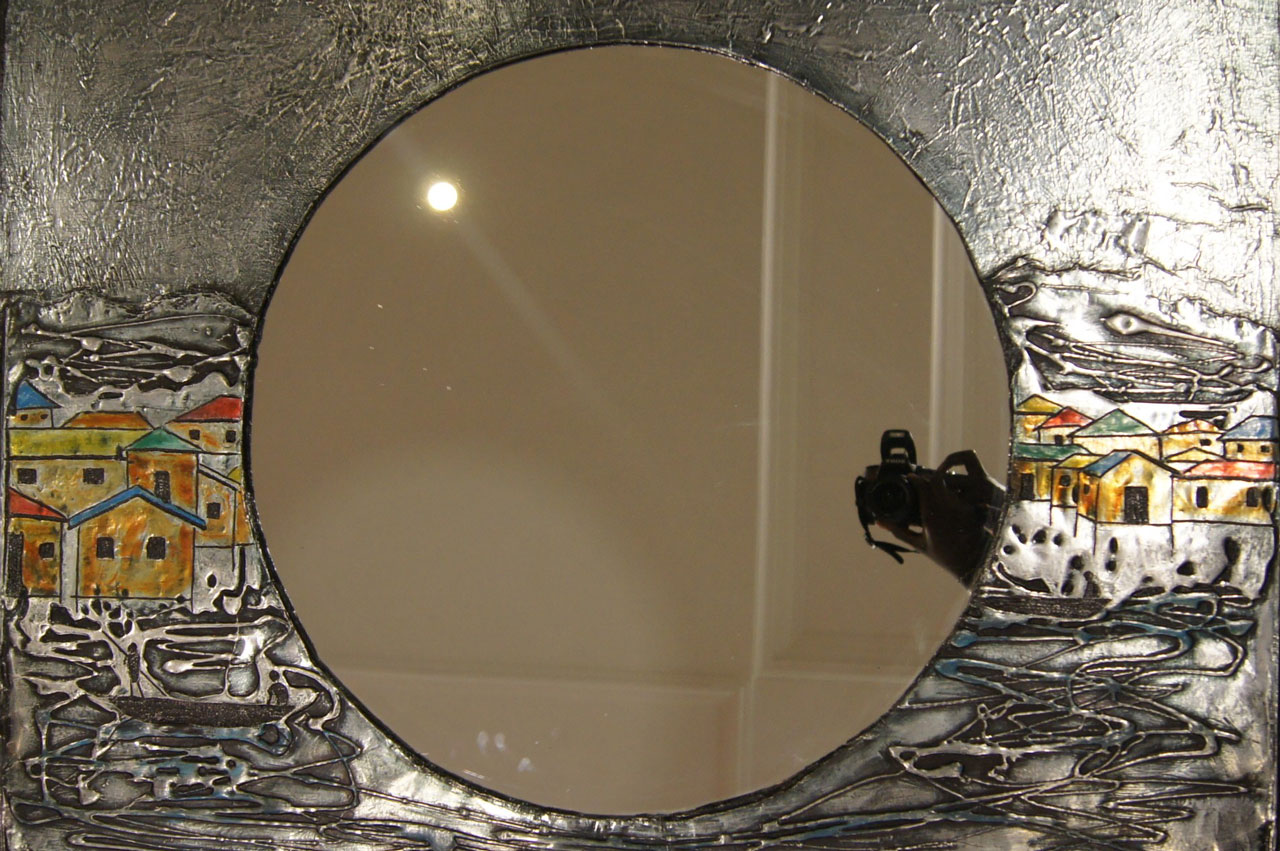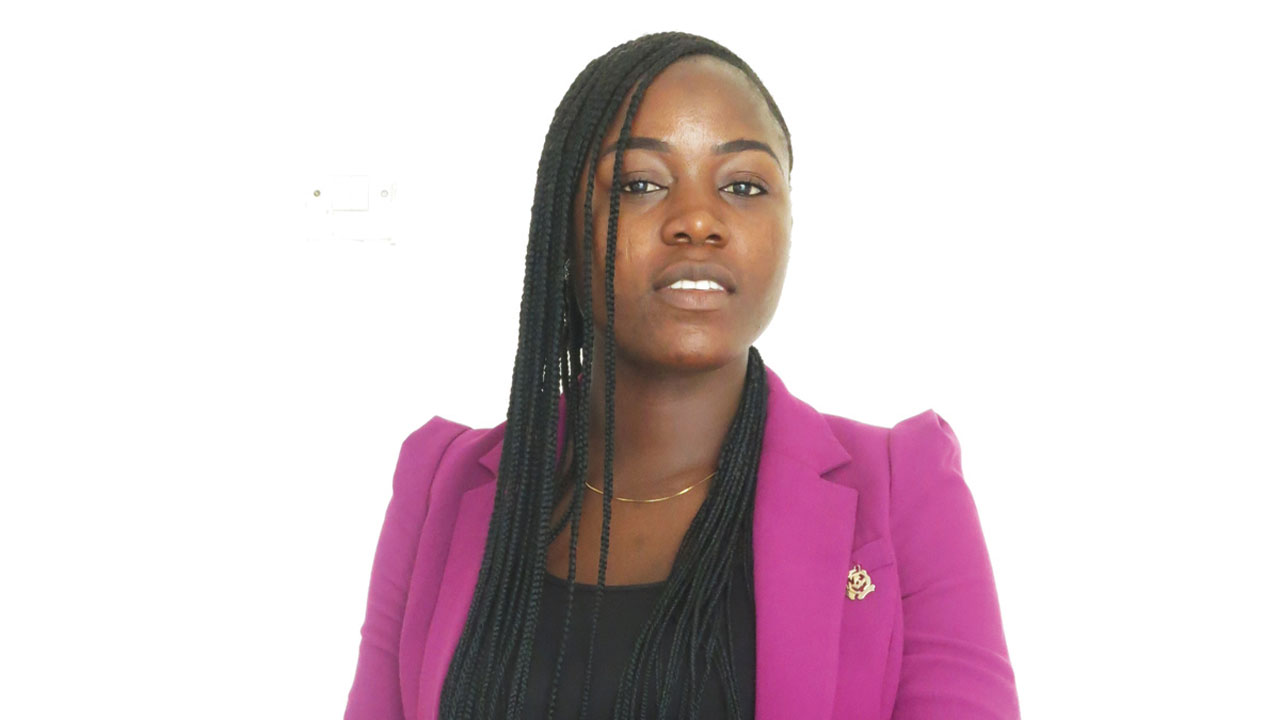
Igbinovia Omon Sophia graduated from Federal Polytechnic, Auchi, in Edo State, Fine Art. Thereafter, she honed her skills at the feet of Africa’s print master, Bruce Onobrakpeya. Now, she has mastered the technique of printmaking, bead painting, plastograph, and metal foil process. Igbinovia loves attractive colours and her works take a critical view of society and everyday activities.
Igbinovia had the rare opportunity of doing her Industrial Attachment at Onobrakpeya’s Ovuomaroro Studio, where she developed the interest in print making, especially metal foil because she saw it as a challenging course that female students stayed away from. She loved the challenges that come with it, unlike painting on canvass.
Talking about her experience at Onobrapeya’s, Omon as she is fondly called, said: “I was fortunate to spend years with the renowned artist; working in his studio was most inspirational, particularly as he discussed and revealed his printmaking techniques. His unsurpassed craft and vision helped transform my work, as I have a deep-rooted desire to explore all facets of printmaking and develop new and varied techniques. I am particularly proud of my metal foil image series and my bead-paintings, which were born of a necessity, and my fascination with the technical process provides a constant evolution of visual imagery.”
Her experience at Onobrakpeya, she confessed, gave her leverage like in her passing out project, “I told my supervisor that I wanted to do metal foil and he was like, ‘can you do it?’ I ended up doing it and I was the one explaining to him how it is done. When I was doing it, some of my classmates were asking why I chose metal foil. At the end of the day, I had one of the best works. I was the only one who did something that no one else did.”
Omon cherished her participation in some notable shows: “Yes, I have participated in the Harmattan Workshop several times in Delta State. I was among the 2015 Copyright Society of Nigeria (COSON) and All Africa Music Award (AFRIMA) graphics team. I have also featured in group exhibitions and books, some of which are Auchi Art Expo 2011; Nigerian/American Exhibition 2012 at Nike Art Gallery, Lekki, Lagos. Ribbon in April II, 2016 at Moore House, Ikoyi, Lagos; Faces and Phases 2016 at Terra Kulture, Lagos; and Onobrakpeya and the Harmattan Workshop Artists 2016 at Lagos Court of Arbitration, Lekki.
The book I feature in is titled The Art of Nigerian Women by Chukwuemeka Ben Bosah; Art-titude by Female Artists Association of Nigeria (FEAAN), South West zone 2017 at Yaba College of Technology; Breathing Art 2017 at Transcorp Hilton, Abuja; and I was among the top 100 finalists in the Union Bank Centenary Art Challenge 2017.”
Her offering at these shows have also received commendation from the audience and patrons alike: “Each time I exhibit, the audience makes me value the works I do more by the way they appreciate it, the positive comments, and it makes me just want to keep doing better. At the Cities and Faces exhibition, I was the only female and I am the first female to have showcased her works at that exhibition. People were amazed. When I got home, I started receiving calls from my colleagues, who were asking me to teach them how to do it. My desire is that my prints and bead paintings will evoke new realities to be savoured by those who wish to enjoy my work.”

One lesson her sojourn at Onobrakpeya’s taught her was better appreciation of internship, she said: “Internship is a period where you are expected to practicalise what you learnt in school as well as learn new things. Some of my classmates at that time went to universal studios and when we got back, most of them were laughing at me. In the whole of my class today, I am the only one practicing arts seriously for a living and it is because of my experience and skills acquired during the internship.”
She has a piece of advice for the upcoming artists especially, those who desire a career in studio work: “I think the issue in practicing arts is a personal thing, one of my classmates who did his one years I.T with Onobrakpeya, the one who also advised me to go to his place for my I.T today does painting just for pleasure, he has another job, he has not made a career out of it like I have. As my creative ideas improve I have developed a new style combining aluminum foil and Mirror, for my artwork to be useful to art lovers and artists.”
Advising on what should be inculcated in the schools curriculum, Omon said: “Outside of what I learnt, I had the experience of attending art functions, which I was not doing before. Students can begin to attend exhibitions even before they graduate. Another thing is I was not thinking of the business side of art but I learnt that there. If we begin to know that we can actually make a living out of arts while we are students, maybe, most of us will take it more seriously.”
Omon thinks Nigeria is appreciating art now more than before, “But I also think the environment where we practice also matters because when you are working on something and someone is encouraging you, you tend to do more. Besides, more art galleries are coming up as well as art collectors, so, the future of arts is getting brighter in Nigeria.”
To Omon, Arts is a vocation through which artists secure their livelihood. This belief has been reinforced by her engagement as an art analyst in an engineering firm. She explains: “There is a department of art as a result of their love for it. So, what I do is basically go out there and look for good works and show to the organization, if they like it, they buy and sometimes resell, otherwise, they just keep it as part of their collection. To me, I am still functioning in the same area and earning money both ways.”
Commenting on abstract art which some people are indifferent about, Omon said: “I think they are like a caution sign on the road, once you look at it you know what it means, I see it as a way an artist wants to express himself.”
Omon sees a great future for art and artists in Nigeria if the government begin to give the sector the type of attention it deserves. She said: “If they give half of the attention they give to oil and politics to arts, they will realize arts can fetch them real revenue and create jobs.”
[ad unit=2]






